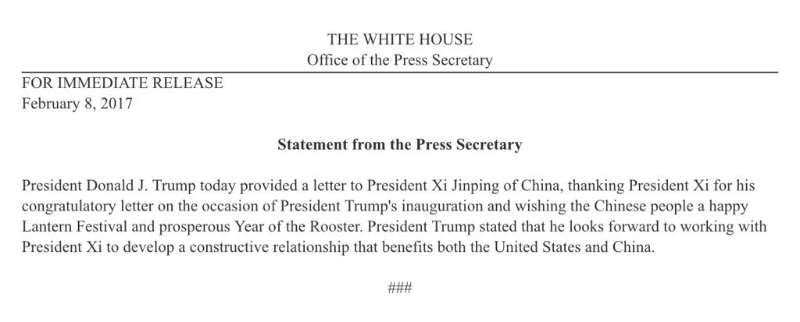
- The Associated Press reports: "China praised U.S. President Donald Trump on Thursday for expressing a desire for a 'constructive relationship' in a letter to Chinese President Xi Jinping, even though the leaders have not spoken directly since Trump's inauguration. Trump sent belated well-wishes for the Lunar New Year in a letter from the White House on Wednesday. He had been the only U.S. president in recent years not to have issued greetings to the world's most populous nation on its most important holiday, which fell this year on Jan. 28. The silence triggered speculation in China as to whether it was an oversight or an intentional slight...Foreign Ministry spokesman Lu Kang said China 'highly commended' Trump for the letter to Xi wishing the Chinese people greetings for the new year and the Lantern Festival that falls on Saturday. Lu dismissed suggestions that Beijing took offense in the timing. 'It is known to all that since President Trump took office, China and the U.S. have been in close contact,' Lu said."
- The Wall Street Journal:Chinese Companies Rush In With Nearly $2 Trillion Where Bankers Fear to Lend
The Wall Street Journal reports: "Chinese companies are increasingly stepping in as lenders, as banks reduce their funding to struggling industries and the country's mammoth bond market comes under strain. Company-to-company loans in China jumped by 20% last year to 13.2 trillion yuan ($1.92 trillion), according to research firm CEIC. That is roughly double the size of the loan book at Wells Fargo & Co., the U.S.'s biggest lender...The most recent surge came during the selloff in China's $9.3 trillion bond market late last year. Big, cash-rich companies—mostly state-owned enterprises and some private companies—stepped in: New entrusted loans rose to 405.7 billion yuan ($59.02 billion) in December, more than double the month prior, according to data tracker Wind Information, and the highest monthly issuance in two years. But the practice poses broader risks for China's economy. Instead of investing in their core business, companies can earn interest rates of up to 20% making entrusted loans, often with only cursory checks on borrowers' creditworthiness. Such lending often props up companies in sectors like mining and property whereBeijing wants to reduce excess capacity."
- The Diplomat comments: "Mattis' public comments mostly reaffirmed the Obama-era status quo of U.S. policy toward the region, mollifying concerns about remarks made by then-Secretary of State designate Rex Tillerson at his confirmation hearing implying that the U.S. would attempt to blockade China. Tillerson has since clarified that his comments applied to actions the United States should take 'if a contingency occurs' in written comments to Senator Ben Cardin. Mattis' comments in Tokyo — particularly his note that the issue was 'best solved by the diplomats' — were seen positively in Beijing...I suggested in my earlier article, though, that Mattis' assurances should not be taken as a total reassurance that the Obama-era approach toward the South China Sea would persist. Indeed, the Trump administration is still reviewing the previous administration's policy along many lines and approaches could change...It's unclear if this administration would take the inadvisable step of rethinking the fundamental basis of U.S. policy in the area and start to take a position on the sovereignty of features, but the Trump administration certainly has shown itself to be willing to break with convention. It's also worth keeping in mind that Steve Bannon, one of the few men with the president's ear throughout the day, sees a U.S.-China war as an inevitability."
- 2017-02-08 Task force backs Trump’s tough line on China trade
- 2017-02-07 China, United States cannot afford conflict: Chinese foreign minister
- 2017-02-06 EU trade chief backs China in fight against protectionism
- 2017-02-05 Chinese Luxury Shoppers' Newest Destination: China
- 2017-02-03 U.S.-China War Over Sea Reefs Won’t Happen, Philippines Says
- 2017-02-02 Can Jim Mattis Fix Asia?
- 2017-02-01 China Manufacturing Activity in January Close to 2-Year High
- 2017-01-25 China Can Thrive in the Trump Era
- 2017-01-24 Trump TPP move seen as win for China, but Beijing isn’t celebrating
- 2017-01-23 China Says Prepared to Lead Global Economy if Necessary
- The Associated Press China Praises Trump's Letter to Xi, Belated Well-Wishes
- The Wall Street Journal Chinese Companies Rush In With Nearly $2 Trillion Where Bankers Fear to Lend
- Reuters Chinese bitcoin exchanges says to strengthen scrutiny of customers
- Bloomberg China Has Got the Yuan in a Sweet Spot
- The Financial Times Trump reaches out to Xi with belated new year note
- The Associated Press China to Start Fingerprinting Foreign Visitors
- Bloomberg Trump Threatens Hollywood's Growth in China
- The Wall Street Journal This Number Points to Danger for Chinese Banks
- The Financial Times Wall Street held back by weak financial stocks
- The Guardian Why Donald Trump can't bully China on trade
- Reuters China's response to THAAD does not warrant South Korean action: minister
- The Guardian Medical journal to retract paper after concerns organs came from executed prisoners
- BBC Chinese protest against hotelier's Nanjing massacre denial
- The Diplomat How the South China Sea Could Heat Up Again in 2017
- The Financial Times: Views Donald Trump's divisive delusions on trade
- Fortune Disney CEO Bob Iger: A Trade War with China Would Hurt Us
- Forbes China's Abusive Trade Practices Likely To Focus Trump's Wrath
- The New York Times: Opinion Pages Trump Pushes Australia Toward China
- Quartz Will the alternative credit rating agency planned by BRICS work?
- Foreign Policy Here's How the U.S. Can Retain Leadership in Asia
